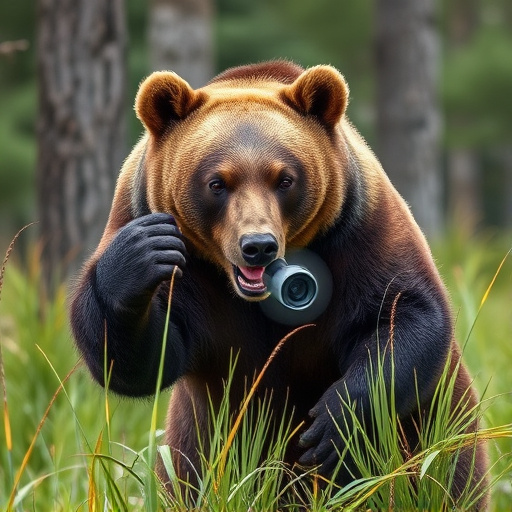Bear spray, containing capsaicin (OC), is a specialized repellent more potent than regular pepper spray for protecting campers and hikers from bears. While both deterrents cause discomfort, bear spray's formula targets bears' sensory organs, making it more effective against larger bears. In contrast to pepper spray's oleocanthal, bear spray's higher capsaicin concentrations offer better protection in bear-inhabited areas, though personal defense pepper spray can be sufficient for smaller predators.
“Enhance your camping experience and ensure a safe outdoor adventure with bear repellent spray – an essential tool for any nature enthusiast. This comprehensive guide explores the world of bear protection, delving into the effectiveness of active ingredients in bear spray compared to pepper spray. We’ll help you navigate the market by analyzing various brands and types, ensuring you choose the perfect bear repellent for your needs. Understand why knowing the difference between bear and pepper spray is crucial, especially when considering its strength and reliability in real-world scenarios.”
- Understanding Bear Spray: Active Ingredients and Effectiveness
- Bear Spray vs Pepper Spray: A Comparative Analysis
- Choosing the Right Bear Repellent Spray for Your Camping Trips
Understanding Bear Spray: Active Ingredients and Effectiveness
Bear spray, a powerful deterrent, has become an indispensable tool for campers and hikers navigating bear-inhabited areas. Understanding its composition and effectiveness is key to ensuring safety in the wilderness. The active ingredients in bear repellent spray are typically pepper-based compounds, such as capsaicin or oleoresin capsicum (OC). These substances are derived from chili peppers and have been proven effective against both black bears and grizzly bears.
When it comes to comparing bear spray to other pepper-based repellents, like hot sauce or pepper spray designed for self-defense, bear spray stands out due to its specialized formula. While regular pepper sprays may provide a momentary sting, bear sprays are specifically formulated to create a barrier of capsaicin that irritates bears’ eyes, nose, and throat, causing them to retreat. This makes bear spray generally stronger and more effective than standard pepper products, designed primarily for human self-defense scenarios.
Bear Spray vs Pepper Spray: A Comparative Analysis
When it comes to self-defense against bears while camping, many outdoor enthusiasts debate between bear spray and pepper spray. Both options serve as deterrents, but they have distinct differences, especially in their active ingredients and effectiveness. The key question many ask is, “Is bear spray stronger than pepper spray?”
Bear spray, also known as bear repellent, typically contains capsicum, a compound derived from chili peppers. It’s designed to cause temporary blindness and severe pain in the eyes and respiratory system of bears, giving campers time to escape. On the other hand, pepper spray commonly uses oleocapsaicin, a related chemical found in hot peppers. While it can also cause discomfort and temporarily disable an aggressor, its effects tend to be more localized compared to bear spray’s broader impact. Studies suggest that bear spray has a higher chance of successfully deterring bears due to its specific formulation targeted at large predators’ sensory systems.
Choosing the Right Bear Repellent Spray for Your Camping Trips
When packing for your next camping adventure, selecting the appropriate bear repellent spray is a crucial decision that can significantly impact your safety in the wilderness. Not all bear sprays are created equal; therefore, understanding their differences is essential before heading into the great outdoors. One common question among campers is whether bear spray is stronger than pepper spray. While both serve as deterrents, they operate on different principles and target distinct sensory systems.
Bear repellent sprays typically contain capsaicin, the compound that gives chili peppers their heat, in higher concentrations than standard pepper sprays. This chemical irritates a bear’s eyes, nose, and respiratory system, causing it to retreat. On the other hand, pepper spray uses oleocanthal, which also stimulates nerve endings but differs from capsaicin in its intensity. As a result, bear spray is generally considered more effective at repelling bears due to its higher concentration of irritants tailored for larger animals like grizzly bears. However, the choice between them depends on your specific needs, as pepper spray might be sufficient for smaller predators or personal defense scenarios.
When it comes to protecting yourself in bear country, a quality bear repellent spray is an indispensable tool. After examining the active ingredients and effectiveness of various options, as well as comparing bear spray to pepper spray, it’s clear that bear spray offers a more robust defense against aggressive bears. Choosing the right bear repellent spray means considering factors like can size, spray pattern, and scent effectiveness. With the proper preparation, campers can enjoy their outdoor adventures with peace of mind, knowing they have a reliable bear deterrent at their disposal. In terms of strength and safety, bear spray stands as a game-changer for outdoor enthusiasts, ensuring a safer experience in wild environments.
